- Home
- Brian Garfield
Hit and The Marksman Page 2
Hit and The Marksman Read online
Page 2
In the end it became just another entry in a file someplace. You brought them in and they went right out again through the revolving door. You came to loathe the organization, and that kind of deep hate was a fervor that got stronger with time and frustration; there was nothing to do, in the end, except quit. To preserve whatever was left of sanity.
When I left the force, feeling as if I had lived through it merely because I happened not to have died from Cutter’s .357 fusillade, I considered going to work as a private operative—one of those eyes who investigate husbands who play golf when it rains. I couldn’t work up any enthusiasm for the idea, or for going back to newspapering, a jungle of scrambled copy in which every edition ought to have eight-column banners on the front page: “ENTIRE CONTENTS FICTION.”
When I tried to explain it all to Joanne, she had told me my point of view was sophomoric and misanthropic. Maybe so. For six months I edited a slick regional monthly that sandwiched gorgeous color photos of southwestern scenery between articles that tried to justify the Paleolithic right-wing notions of the rich ranchers who owned the magazine. The views weren’t mine but the salary was high. I thought, at first, money would make a difference.
But after a while I sickened of the idea of spending money I didn’t have to buy things I didn’t need to impress people I didn’t like. That was when I gave up the job, and job-hunting, and took my indefinite sabbatical. I moved out of my downtown, semi-detached, split-level, modern, air-conditioned bungalow garden court apartment (with pool privileges), and bought the old rock fort in the hills with the last of my severance pay.
It came cheap; nobody wanted an ugly stone house so far off the main-traveled roads. No one seemed to know who had built it, or when. It was old, squatting sunblasted and craggy on the desert hill, with its own well and its six rooms, or seven depending on your method of counting, and its sizable population of centipedes and black widows which congregated in the seams between the rocks. The lights, refrigerator and noisy rooftop swamp cooler were powered by electricity from a small Koehler diesel generator bolted on a wooden platform in a lean-to against the back wall. The enclosure looked like the cover on a coal chute; the little two-cylinder engine sat two feet off the ground on its platform to keep dust out of the works. It thumped and clattered incessantly; it was an intolerable gnashing of pistons and valves, pulsing out unsteady direct current.
The nearest neighbor was three miles away; the hills were all rocks and dust and cactus. A hundred feet behind the house was a square stone shed that had once been a carriage barn. Inside it, I kept the rock equipment—tumblers, grinders, barrels, diamond saws, drills.
I supplemented my pension by rockhounding. As a business it was pointless—an individual with secondhand, backroom machinery couldn’t make much of a living … But its pointlessness was part of its beauty. Out of the tumblers came brilliant gems—for rings, pendants, earrings, rock-bolo desert neckties, all the gimcracks tourists picked up in curio shops. The rocks didn’t bring in much money but they made me a time and a place: time to wander the desert and mountains in search of the garnet and agate and countless other semiprecious stones that littered the canyons in uncut, unpolished disguise.
It was a land of heroic proportions. It was dangerous if you took it for granted; you shook out your boots in the morning before you put them on, to avoid scorpion stings, and you kept the legs of the bed in half-full cans of kerosene to dissuade the bugs from crawling in with you. The sun burned wherever it struck. But when you took a breath, it tasted clean and you knew nobody had ever breathed that lungful of air before you.
I poured a glass of milk—I have never liked coffee—and took it outside. The dry heat made my cheeks sting with shaving rash. I brooded on the rose bushes Joanne had planted along the gravel walk. She had left herself all over the place. The roses were starting to bloom again; in the desert you could get five or six blooms in a year if you kept them watered. I turned on the faucet and watched the water make mud, flowing along the shallow trenches from bush to bush. I had spent a month self-disciplining myself into the conviction that it hadn’t been important enough for me to bother tearing out all the reminders of her by the roots. But her phone call brought it all back, very whole, very sharp and vivid.
It was going to be a scorching hot day. In the shade on the front step I drained the milk and thought about what we had said six months ago. It had been one of those miserable conversations where neither of us could meet the other’s eyes. “Darling,” she had said, “I wish we could have kept it casual, the way you wanted it, but I’m not made that way. It’s my fault—I know you didn’t want it to get too intense.”
I had tried to persuade her to change her mind. She had lashed out (afterward I understood why): “Simon, you’re hiding away up here, you just can’t commit yourself to anything or anyone. You tried to fight city hall and you lost, so you quit. You haven’t got room left in you for me or anything else outside yourself. I’ve already had that with Mike, more than I could take. I haven’t the strength left.”
The Jeep had been packed with my rock chisels and canteen. I had acted tougher than I felt, because I couldn’t fathom my own contradictory feelings. I had climbed into the Jeep and she had walked over to me and said, “I won’t be here when you get back.” I had driven on down the hill without looking back to see if she was watching. It turned into a rotten day—I wanted to call her but wasn’t sure whether she wanted me to. Sometimes it was hard to be sure of Joanne’s meanings; she was changeable: sometimes she told you only part of the truth because she thought the whole truth would hurt.
I had seen her only once after that—a week later, an accidental meeting. She had let it slip; I never knew whether it was deliberate or an honest slip—She’d said something that had given me a foothold and I had pried the rest out of her, questioning her roughly like an interrogating cop, and finally there it was: Aiello. I was an ex-cop—an ex-honest cop—and Aiello had told her to stay away from me. She hadn’t told me before because she knew my temper; she didn’t want me to go gunning for Aiello because I wouldn’t have a chance against the organization.
I knew better than to ask her to quit working for Aiello. I had never even asked her how she’d got mixed up with the organization in the first place. Those were questions you just didn’t ask. It went without saying they had some hold over her. They always do.
I had told myself, angrily, it was her choice and I had to honor it. We had to avoid each other for however long it might take to blunt the edges of dangerous emotions. I had to acquiesce because I could not compromise her with the organization; Aiello was not an understanding or forgiving type and his organization played rough.
Now I saw the dust of her car coming up the dirt-road from the county highway. I felt ill at ease, betrayed; I had steeled myself against her absence but now she was coming back, not for the reason I would have wanted.
It was impossible to ignore my anticipation—I wanted to see her.
I waited in the shade until she drove the beige convertible into the yard and parked beside my Jeep. She had the top down; she turned and watched through her sunglasses as I walked out of the shade to open the car door. She didn’t smile. “Thanks for letting me come.”
Very gravely, I said, “Is it bad?”
“As bad as it can get.” She swung her legs out, stood and smoothed down the tight skirt—it was white poplin; she wore a green sleeveless blouse that clung to the curved undersides of her breasts and showed off her smooth brown arms. She had a dancer’s hard little body, superb legs; her face was small, heart-shaped and lovely.
The wind had roughed up her hair; there was a thread of moisture on her upper lip. She looked heat-flushed and scared. I couldn’t really make out her eyes through the big sunglasses. She looked faint. “I feel like such a fool. Nothing can happen on a beautiful day like this, can it?” Her smile was quick and nervous. She kept looking down the road, as if somebody were chasing her. “Can’t we talk inside?”
“Sure.”
She had a curious detached fortitude; I had seen it before: the world could be falling down around her and she would still have to set the stage, get everybody in position before telling them about the disaster. We walked toward the house. I was sharply aware of the quick rat-tat of her heels on the gravel and the nylon whispers of her thighs. Her head hardly came up to my shoulder; the skirt was tight, but she moved along quickly with crisp lithe strides.
I went inside after her and let the screen door slam behind me with a weatherbeaten, slapping sound. It made her jump; she smiled apologetically and slumped against the doorjamb, leaning against it with her shoulder propped up. She said, “I’m in a state of absolute utter panic,” and shoved herself toward the kitchen. She marched in and disappeared around the corner. I followed scowling, and when I reached the kitchen door she was filling the percolator.
“I don’t even know how to begin. I suppose that’s why I’m puttering around like a madwoman.” She put the sunglasses away in a pocket sewn in her skirt. Her big violet eyes were provocative, more from habit than design. She measured the coffee and put it on to boil.
I said, “Why don’t you sit down and get a grip on yourself. I’ll do that.”
“You’ve got no talent with coffee,” she said. “I’ve got to have something strong and hot or I swear I’ll collapse right here.” She shook out a cigarette and found a match by the stove. Her hands trembled violently. I took the match away from her; she clamped the cigarette in her teeth while I lighted it.
She shook her head in violent angry defiance, as if to clear it. She took a deep drag on the cigarette and let it out slowly; she gave the coffee a waspish glance, because it hadn’t already come to a boil, and when she had exhaled the lungful of smoke she said in a half-hysterical airily light way, “Aiello is gone.”
“What?”
“Gone. Just … gone. The house is empty and the safe’s wide open. Empty.”
She tipped her head far over to one side like a little girl and gave me a peculiar, savage grin. “Isn’t it lovely?”
My pulse thudded. “Great,” I agreed. “You’d better tell me about it.”
She waved a hand in an arch gesture and turned to face the stove; over her shoulder she said vaguely, “They’ll think I did it, naturally. Got rid of Aiello somehow and robbed the safe.”
“Naturally?” I echoed dryly. “Sure. Naturally they’ll pick you first—I mean, you being an expert safecracker and all—”
“Don’t make jokes,” she snapped.
I scraped a hand across my mouth. She lifted the coffee off the stove. I couldn’t see her face, but the line of her back was taut, tense, brittle, like a cornered animal.
The coffee smoked as it poured out of the pot; it was black and oil-thick. She carried the mug into my small living room.
I followed, stopping in the doorway. The roof cooler pushed a slow damp breeze across the room. I waited until she sat down on the couch and then I said, “All right. Go over it again—try to make some sense. What happened?”
She tucked her feet under her and held the coffee in both hands and blew on it. “I got to the house at seven-thirty, as usual. Aiello likes to work before ten and after four—he hates the heat, he spends the middle of the day in the indoor pool with the air conditioners blowing on his vodka collinses.”
“Only this morning he wasn’t there.”
“It isn’t that so much; he often spends the night out, but when he does, he always leaves somebody in the house on guard. This time there was nobody. And the safe, wide open and empty. Papers scattered around the office. The place has been ransacked.”
“Maybe he cleared it out himself and took the stuff somewhere else for safekeeping. Maybe he got word there was going to be a raid.”
“I don’t think so,” she said.
“Why not?”
“I just don’t.” She looked up momentarily. “I know him—you don’t.”
“Uh. What was in the safe?”
“You’d be better off not knowing.”
I shook my head. “If it’s what you think it is, the mob will react. The kind of reaction will depend on what was inside the safe.”
She took a suicidal drag on her cigarette and stabbed it out in the ash tray. With smoke trailing from her mouth she said, “Let’s just say there was enough to make it worth their while to kill half the population of this town to get it back.”
“Cash?”
“A lot of cash. And files—the kind they couldn’t afford to see in print.”
“How much cash?”
“I never counted it,” she said, snappish. “It was a hell a lot, millions I suppose, but I don’t know. I’m supposed to be Sal Aiello’s secretary but there are a lot of things I don’t get to see.”
“Go on.”
“Look, Simon, I’m only part of the front. All the big shots try to look like legitimate businessmen, and part of the act is having a pretty secretary who doesn’t look as if she came out of a reform school typing course. Aiello has his finger in quite a few legitimate businesses, enough to keep me busy with correspondence and phone calls and filing. I know it’s all a front and he knows I know it, but it’s the kind of thing you never say out loud. I don’t get to see the books and I’ve never even been in the same room when he had the safe open. The safe isn’t in the office, you know—it’s in the library. But I’ve absorbed enough loose talk to know they keep dynamite in that safe. Aiello isn’t the only one who uses it. Vincent Madonna has things in it. So does Pete DeAngelo and any number of others. It’s like a central clearing station for all of them—it’s an old vault they bought from a California bank that went out of business.”
“How old?”
She blinked. “How should I know?”
“It’s not a silly question. If it’s old enough, it’s easy to crack—and they wouldn’t keep top-secret dynamite in a cracker box.”
“Of course they would,” she snapped. “My God, Simon, sometimes Aiello keeps a hundred thousand dollars in cash lying around the office in unlocked drawers. Nobody has the nerve to rob the Mafia.”
“Apparently,” I remarked, “somebody did.” It occurred to me this was the first time I’d ever heard her use the word “Mafia.” I said, “Who else knows about this?”
“I don’t know. Maybe they haven’t discovered it yet. What time is it?”
“Nine-thirty.”
“He didn’t have any appointments for today. But Madonna and DeAngelo drop around when they feel like it. So do a lot of other people; it’s like a clubhouse up there. I know I haven’t got much time—God, Simon, when I saw the mess I knew all of it, right in that split second, I knew I was in terrible trouble. I don’t know what to do.”
I watched her for a moment, then headed for the bedroom. “Stay put a minute,” I told her, and went to the phone by the bed. I dialed Nancy Lansford, my neighbor down the road, a two-hundred-pound spinster who lived on a small inheritance and spent the winters taking tourists and school children on nature walks in the desert. She owed me a few favors—her house was full of polished rocks I’d given her. She was a relaxing old windbag, tart and practical as only a fanatically conservationist old maid could be.
She answered breathlessly on the fifth ring; I identified myself.
“Oh, Simon, good morning, isn’t it a beautiful day?” She had a reedy, chirping voice. “I was outside watching a buzzard with my field glasses. Aren’t they remarkable birds? Why, only last week I—”
I cut her off: “Nancy, I need a little help.”
She answered immediately: “Name it.”
I grinned into the phone. “I may have some visitors this morning and I’d like to have a little advance warning if they decide to come. Would you let me know if any cars start up the road toward my place?”
“Of course. But why—”
“I haven’t got time to explain,” I said. “If anybody drives by your house, just dial my number, let the phone ring twice,
and hang up. Don’t wait for me to answer, just hang up after two rings. Got it?”
“I’ve got it. I must say you sound very mysterious.”
“I’ll tell you about it later,” I said, thanked her and hung up.
When I looked around, Joanne was standing in the doorway, her eyes wide. She narrowed them and said, “I was eavesdropping.”
I nodded. “If they want to find you, this is one of the first places they’ll think of looking. I’ll feel better with a few minutes’ warning.” Nancy lived three miles away, at the foot of my road.
She said, “I’m glad—because I’m sure they’ll be after me.” She went back into the living room. When I got there she was back on the couch with her coffee, lighting another cigarette. She was addicted to menthol cigarettes and strong coffee.
She said, “You never asked me any questions, but I suppose you must have figured out that they had something on me, to keep me—loyal.”
“Yeah,” I said, without inflection.
“It was in that safe.”
“What was it?”
“I don’t want to tell you. What difference does it make? Papers, tape recordings, pictures, movie films. It was there. Now whoever took it has it, and I’m scared of what they may do with it.”
There wasn’t much for me to say. I waited. Presently she resumed: “Naturally they know I knew it was there. They’ll assume I wanted to get my hands on it so they wouldn’t have a hold over me any longer. And they’ll assume I told you about it, and you and I cracked the safe, to get it, and got rid of Aiello somewhere. They’ll assume that,” she added with a shudder, “because if fantasies came true, it’s exactly what I would have done.”
“You mean you were planning to burgle the safe?”
“Don’t be silly, I wouldn’t know how. But I wanted to—a silly dream, I guess, but it was the only hope I had. I even thought of conning you into helping me do it.” She slanted a smile at me, twisted and nervous. “The irony is, I didn’t do it, but they’ll blame it on me, anyway.”

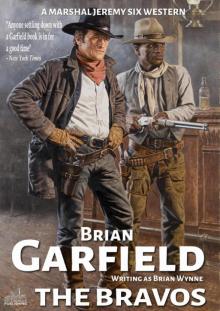 Marshal Jeremy Six #3
Marshal Jeremy Six #3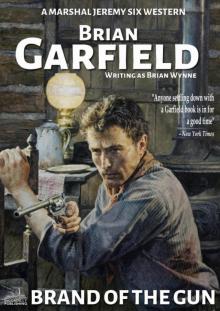 Marshal Jeremy Six #6
Marshal Jeremy Six #6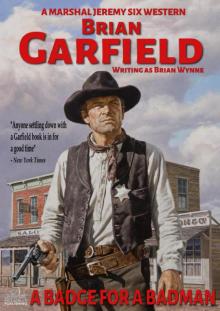 Marshal Jeremy Six #5
Marshal Jeremy Six #5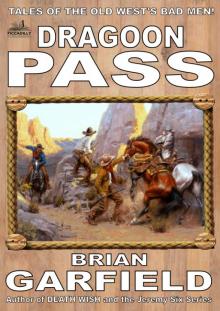 The Outlaws 2
The Outlaws 2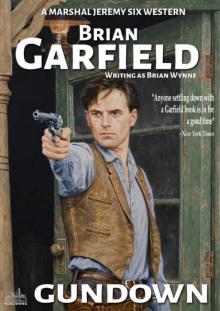 Marshal Jeremy Six #7
Marshal Jeremy Six #7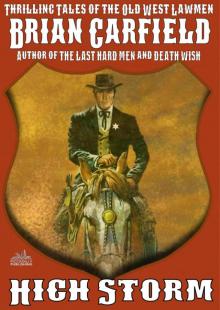 The Lawbringers 4
The Lawbringers 4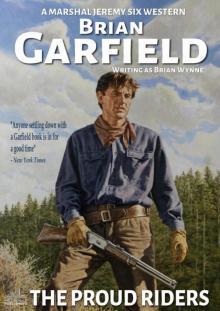 Marshal Jeremy Six #4 the Proud Riders
Marshal Jeremy Six #4 the Proud Riders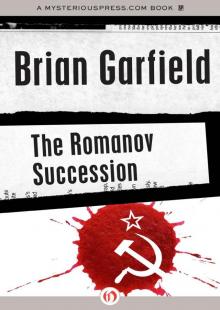 The Romanov succession
The Romanov succession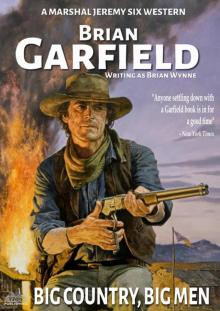 Marshal Jeremy Six #8
Marshal Jeremy Six #8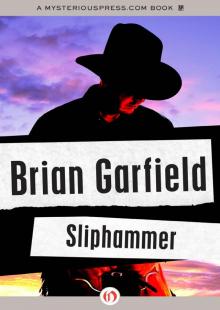 Sliphammer
Sliphammer Line of Succession
Line of Succession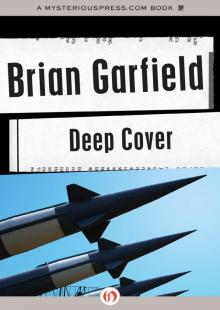 Deep Cover
Deep Cover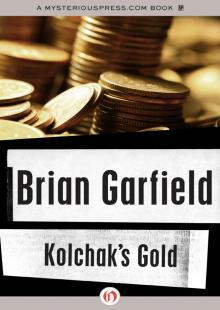 Kolchak's Gold
Kolchak's Gold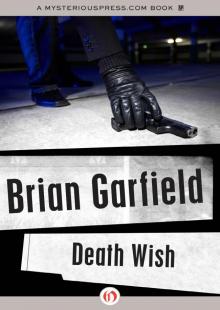 Death Wish
Death Wish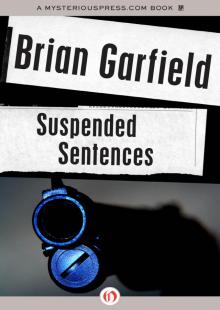 Suspended Sentences
Suspended Sentences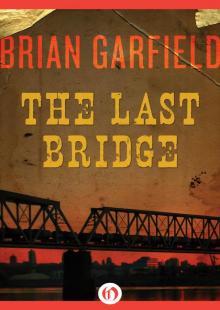 The Last Bridge
The Last Bridge Relentless
Relentless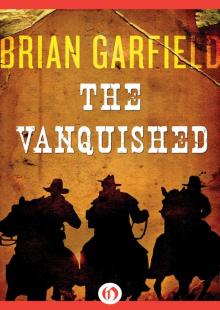 The Vanquished
The Vanquished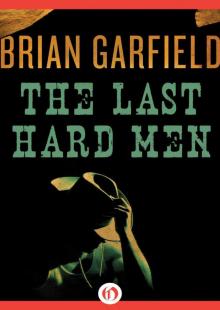 The Last Hard Men
The Last Hard Men Hit and The Marksman
Hit and The Marksman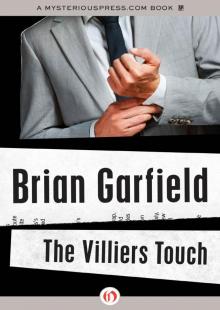 Villiers Touch
Villiers Touch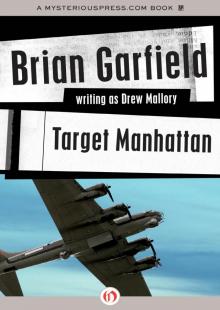 Target Manhattan
Target Manhattan Marchand Woman
Marchand Woman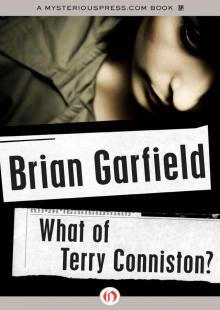 What of Terry Conniston?
What of Terry Conniston?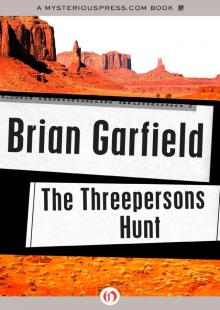 Threepersons Hunt
Threepersons Hunt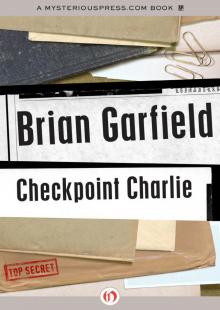 Checkpoint Charlie
Checkpoint Charlie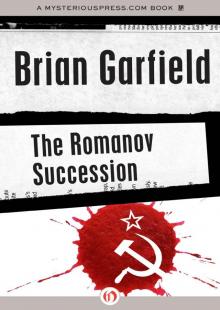 Romanov Succession
Romanov Succession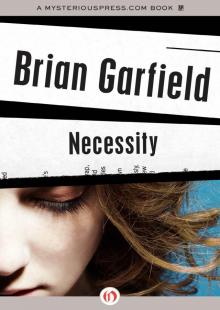 Necessity
Necessity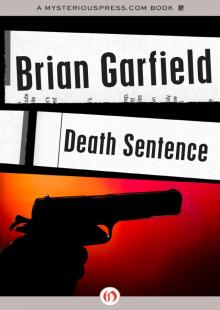 Death Sentence
Death Sentence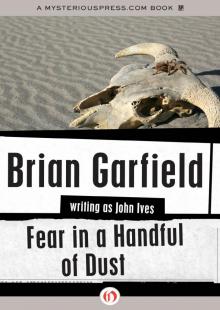 Fear in a Handful of Dust
Fear in a Handful of Dust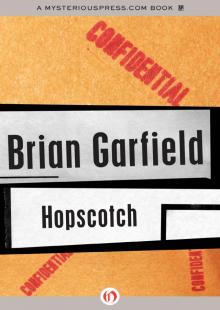 Hopscotch
Hopscotch